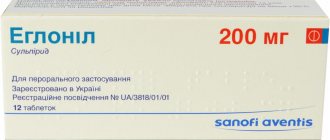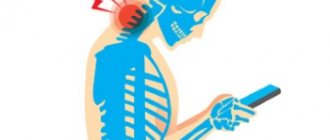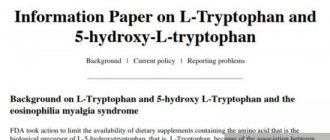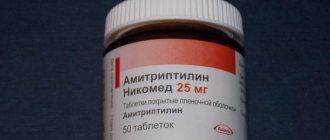Antidepressant "Citalopram": instructions for use
Antidepressants are medications for the treatment of depression and anxiety.
The antidepressant Cipralex belongs to the group of SSRIs, selective serotonin reuptake inhibitors. The SSRI group of antidepressants are easily tolerated drugs for depression with minimal side effects. The group includes the following antidepressants: citalopram, paroxetine, fluoxetine, fluvoxamine, sertraline, escitalopram (cipralex).
The main mechanism of drugs in this group is to block the reuptake of serotonin from the synaptic cleft, which allows increasing the concentration of neurotransmitters in the central nervous system.
Patients can receive further treatment in a hospital setting; patients recover in a rehabilitation center. Complex treatment includes sessions with a psychotherapist who helps you change your attitude towards life and believe in yourself.
As therapy, the psychotherapist uses the latest generation of antidepressants with minimal side effects, which often occur with long-term use of medications.
Cipralex is an antidepressant, an SSRI, a selective serotonin reuptake inhibitor. The color is white, available in the form of film-coated tablets with markings on the surface of the tablet. The composition of the tablet is escitalopram oxalate 10 mg.
The action of the drug is to inhibit the reuptake of serotonin, prolonging the action of serotonin on postsynaptic receptors.
The drug almost does not bind to dopamine, m-cholinergic, serotonin and adrenergic receptors. The effect of the drug develops slowly, occurring 2-3 weeks after the start of therapy.
The maximum effect is achieved several months after the start of treatment.
Pharmacokinetics: absorption of the drug does not depend on food intake, maximum plasma concentration occurs after 4 hours. Equilibrium concentration of the drug is achieved after a week. Metabolism of the drug occurs in the liver, is excreted by the liver and mostly by the kidneys in the urine.
Elimination of the drug occurs faster in younger patients than in older patients. In patients with moderate to mild hepatic impairment, the half-life of the antidepressant is doubled.
The patient's decreased renal function results in a long half-life of the drug.
Indications for use of the drug: Cipralex is prescribed for any degree of severity of depressive disorder, for panic disorders without or with the presence of agrophobia, for anxious social disorder, generalized anxiety disorder, obsessive-compulsive disorder.
Taking drugs of this group in the later stages of fetal development can lead to various side effects and complications: apnea, cyanosis, respiratory depression in the newborn, constant crying, poor sleep, hypotension, increased neuro-reflex excitability, hypertension and other conditions.
Complications develop immediately after birth or within 24 hours after birth. Taking the drug is not allowed while breastfeeding; the drug is excreted in mother's milk.
During animal studies, a reversible effect of the antidepressant on sperm was noted; no effect of the drug on human fertility was observed.
Taking the drug: the drug is prescribed once a day. Depending on the type of mental disorder, the doctor prescribes a certain dose of an antidepressant.
Panic disorder without or with agrophobia - the initial dose of the drug is prescribed depending on the severity of the disorder in the amount of 5 mg, then the dose is increased to 10 mg per day. The dose may be increased (20 mg per day) depending on the individual sensitivity of the patient.
Anxious social disorder - the initial average dose of the drug is 10 mg, depending on the patient's sensitivity to the drug, it can be reduced or increased.
Treatment of obsessive-compulsive disorder begins with 10 mg per day. The dose is then increased to a maximum of 20 mg. This disorder has a chronic course, treatment continues for a long time. The drug should be used with caution in patients over 65 years of age with reduced renal function. The initial dose of the drug is 5 mg, the dose can be increased to a maximum of 10 mg.
Side effects:
- Hematopoietic system – thrombocytopenia.
- Endocrine system - insufficient secretion of ADH, metabolic disorders (appetite disturbance, weight gain, anorexia, hyponatremia).
- Immune system – anaphylactic shock rarely occurs.
- Mental health – anorgasmia, anxiety, unusual dreams, restlessness. Uncommon: panic attacks, nervousness, bruxism, agitation, confusion. Rarely – depersonalization, aggression, hallucinations. The emergence of suicidal thoughts and suicidal behavior was also noted.
- Nervous system – dizziness, insomnia, paresthesia, tremor. Infrequently, sleep disturbances, taste disturbances, and syncope develop; serotonin syndrome rarely develops.
- Cardiovascular system - infrequently rapid heartbeat, rarely bradycardia, other complications of the heart.
- Respiratory system - sinusitis, yawning, and infrequent nosebleeds develop.
- Gastrointestinal tract – dry mouth, constipation, diarrhea, vomiting, infrequent bleeding in the gastrointestinal tract.
- Musculoskeletal system – myalgia, arthralgia.
- Urinary system – urinary retention, swelling.
- Reproductive system - uterine bleeding, impotence, impaired ejaculation, menorrhagia, possible development of galactorrhea, priapism.
Reviews from doctors indicate the high effectiveness of the drug for mild to moderate depression and anxiety disorders. Doctors note a minimal number of side effects. The drug is not addictive and is well tolerated. The disadvantage of the antidepressant Escitalopram (Cipralex) is its high price.
Treatment in Moscow
Depression is a condition that does not go away on its own. Untreated depression can progress to a severe stage - in this case, the patient can only be treated in a specialized hospital under the supervision of psychiatrists.
Since treatment with antidepressants has its own characteristics, during therapy the patient is prescribed a special diet and psychotherapy sessions. At the Yusupov Hospital, qualified specialists provide assistance to patients with depressive disorders.
Attention, effective treatment, diet help to quickly recover and return to normal life. You can make an appointment by calling the hospital.
- ICD-10 (International Classification of Diseases)
- Yusupov Hospital
- World Health Organization. F4 Neurotic, stress-related, and somatoform disorders // International Classification of Diseases (10th revision). Class V: Mental and behavioral disorders (F00-F99) (adapted for use in the Russian Federation). - Rostov-on-Don: Phoenix, 1999. - P. 175-176. — ISBN 5-86727-005-8.
- Shear MK, Brown TA, Barlow DH, Money R, Sholomskas DE, Woods SW, Gorman JM, Papp LA. Multicenter collaborative Panic Disorder Severity Scale. American Journal of Psychiatry 1997;154:1571-1575 PMID 9356566.
I decided to write not only about amitriptyline, but also about all the other antidepressants that I took. I’ll start with Cipralex, since it was my first (sounds like ????), and in general, many doctors prefer to start treating depression with it. This is a very clear and good representative of the SSRI class of antidepressants (more about the classes here).
Cipralex analogues
I'll start from this point. It is worth noting that this drug is not just expensive, but drop-dead expensive, costing more than two thousand rubles per month. When I took it, there were no generics; the drug had recently appeared and was the only one of its kind. Now you can choose.
There is domestic escitalopram for 300 rubles per month (where were you, you bastard, when I paid crazy amounts of money for Cipralex??), there is Selectra (Switzerland, Iceland) for 1000, there is Lenuxin and Elicea. Choose - I don’t want to.
If you have drank Russian bottled escitalopram, please share how you liked it. It will be interesting to know not only for me, but also for other people who will read this article.
Of course, this is, first of all, depression. It is also prescribed for panic and anxiety disorders, agoraphobia (fear of crowds) and other phobias.
This antidepressant doesn’t really work in other areas (not mental) - well, like for neurogenic pain, like amitriptyline.
This is a very targeted and narrowly targeted remedy, the main task of which is to bring calm to your long-suffering brains.
The usual dose is 10 mg. You need to start with 5 mg (half a tablet), especially for those who have phobias and panic attacks, since if you immediately chug the whole one, it will cause a lot of anxiety. Well, of course, it is best to add a small dose of a tranquilizer at the beginning to reduce side effects.
If you have been on 10 mg for a month and there is no effect, then it’s time to explore new horizons - 15 and 20 mg (maximum dose) are waiting for you. This will be difficult if you don’t have a lot of money, and you are taking the original drug or an expensive generic. At one time I had to give up Cipralex because I couldn’t afford 20 mg.
You need to take Cipralex for at least six months. During this period, you can suppress panic attacks well, then gradually get off it and enjoy life. If you are depressed, it is better to drink more. Although, if you are also undergoing psychotherapy, then it will be possible to give up the antidepressant faster - take it, for example, for less than a year. But if there is no psychotherapy, then at least a year.
- affective (bipolar, depressive, dysthymic) disorders;
- depression of various origins;
- anxiety-phobic disorders (panic, phobic, generalized anxiety, obsessive-compulsive, post-traumatic stress);
- mixed anxiety-depressive disorders;
- somatization disorder;
- dementia of vascular origin with depressive symptoms;
- psychosomatic diseases with autonomic dysfunction;
- depression in elderly people;
- depressive disorders in females (pregnant depression, premenstrual dysphoria, premenopausal depression, postpartum depression);
- depression due to alcoholism;
- eating disorders (bulimia, anorexia).
Who is prescribed Escitalopram?
The instructions indicate the conditions for which the drug "Escitalopram" is prescribed:
- Depressive disorders.
- Generalized anxiety disorder.
- Panic attacks.
Before you start treatment, you need to make sure that you have no contraindications for use. The attending physician should also know about them.
Application
Escitalopram is indicated for depression (32., 33.) and panic disorders (41.041.0, 41.141.1). Some patients with panic disorder may experience increased anxiety at the beginning of treatment with escitalopram, which usually disappears over the next two weeks of treatment. To reduce the likelihood of anxiety, low initial doses are recommended.
Escitalopram can be used in combination with other drugs for difficult-to-treat depression. However, you cannot combine drugs belonging to the same group of antidepressants [ source not specified 1523 days
]. Possible interactions include, for example, combining escitalopram with bupropion or mirtazapine.










